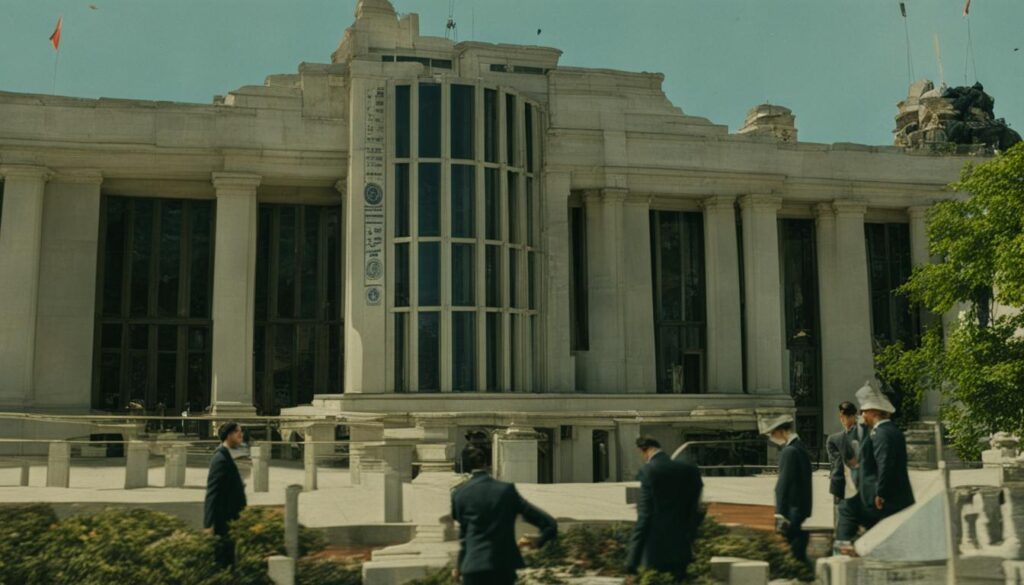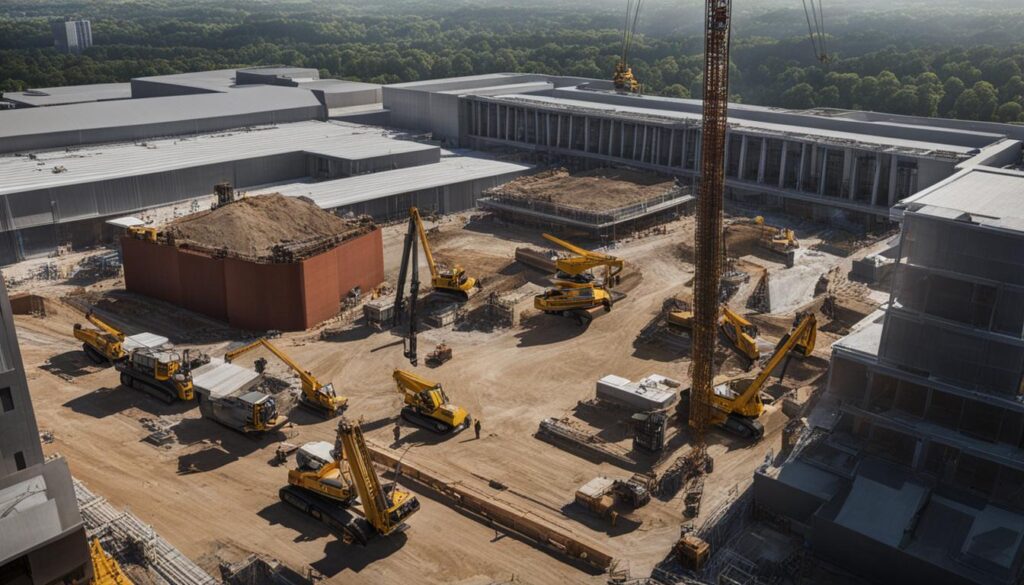In Victoria, local councils play a crucial role in the approval process for construction projects. As responsible authorities within their municipal districts, they have the power to implement and enforce building regulations, ensuring the safety and quality of the built environment. This article will explore the important role of local councils in Victoria and their contributions to promoting sustainable urban development and professionalism in the construction industry.
Key Takeaways:
- Local councils in Victoria are responsible for approving construction projects within their municipal districts.
- Their role includes enforcing building regulations, ensuring the safety of the built environment, and promoting consumer confidence.
- Local councils have the power to enter and inspect buildings, issue building notices and orders, and impose infringements.
- Their involvement is crucial for promoting sustainable urban development and maintaining high levels of professionalism in the construction industry.
- Collaboration between local government and responsible authorities is essential for effective building regulation and oversight.
The Building Control System in Victoria
In Victoria, the building control system is governed by two key legislations – the Building Act 1993 and the Building Regulations 2018. The primary objective of this system is to ensure the construction of a safe built environment while promoting consumer confidence and maintaining high levels of professionalism among industry practitioners.
Local councils play a critical role in enforcing building regulations within their respective municipal districts. Section 212 of the Building Act assigns them with the responsibilities of administration and enforcement. To fulfill these responsibilities, councils appoint Municipal Building Surveyors (MBS). The MBS have the authority to protect public safety, issue necessary notices and orders, and perform inspections to ensure compliance with building codes and regulations.
By actively enforcing the building control system, local councils contribute to the overall goal of creating a safe built environment in Victoria. Their efforts ensure that construction projects adhere to the necessary standards and regulations, safeguarding the lives and well-being of the community.
Building control in Victoria is a collaborative effort that involves multiple stakeholders, including local government, building surveyors, and industry professionals. This integrated approach ensures that all aspects of construction, from planning to completion, comply with the necessary regulations.
“The building control system in Victoria serves as the backbone for creating a safe and sustainable built environment. It is through the diligent enforcement of building regulations by local councils that we can trust in the integrity and safety of our infrastructure.”
Being proactive in building regulation enforcement is crucial for maintaining consumer confidence in the market and promoting a culture of professionalism within the construction industry. Together, these measures contribute to the overall growth and development of Victoria’s infrastructure and ensure that residents can live and work in buildings that meet the highest standards of safety.
Importance of Local Government Involvement in Building Control
Local councils play a critical role in building control and ensuring effective regulation and oversight. They have specified roles and responsibilities in enforcing building regulations, which are vital for maintaining a safe and compliant built environment.
It is essential for local councils to have a clear understanding of their roles and responsibilities in building control. This includes the organizational understanding of their jurisdiction and the importance of the building control function. By having a comprehensive understanding, councils can effectively fulfill their responsibilities under legislation and contribute to the overall success of the building control system.
One of the key aspects of local government involvement in building control is adopting a risk-based approach. This approach focuses on identifying and managing risks associated with building projects in a prioritized manner. By utilizing a risk-based approach, local councils can allocate resources efficiently, ensuring that higher-risk projects receive the necessary attention and scrutiny.
Collaborative arrangements with other councils can also enhance the effectiveness of building control. This includes sharing resources, knowledge, and expertise to improve regulatory practices. Reciprocal delegations can be established between councils, allowing for the seamless transfer of responsibilities and ensuring consistent enforcement across different municipal districts.
Furthermore, local councils should prioritize building control issues within their municipalities. By giving due attention to building control, councils can address potential risks and ensure compliance with building regulations. Developing policies and guidelines specific to their municipality can provide clear guidance to both council officers and applicants, further promoting an effective and efficient process.
Overall, the involvement of local government in building control is crucial for maintaining a safe and compliant built environment. By understanding their roles and responsibilities, adopting a risk-based approach, and prioritizing building control issues, local councils can effectively contribute to the success of the building control system.
Key Points:
- Local councils play a critical role in building control.
- Understanding roles and responsibilities is essential for effective building control.
- A risk-based approach helps prioritize resources and address higher-risk projects.
- Collaborative arrangements between councils enhance building control practices.
- Prioritizing building control issues and developing policies ensure compliance and efficiency.

Building Issues Dealt with by Local Government
Local government plays a crucial role in addressing various building issues to ensure the safety and well-being of their communities. Let’s explore some key areas where local councils are actively involved in managing building-related challenges:
1. Illegal Occupancy
Local councils are responsible for addressing illegally occupied buildings, which pose significant risks to both occupants and the public. These buildings may lack the necessary permits and compliance with building codes, jeopardizing the safety and structural integrity. Through inspections and enforcement actions, local government works diligently to rectify these situations and protect the well-being of residents.
2. Places of Public Entertainment
Regulating places of public entertainment is another critical role of local councils. From concerts to sporting events, ensuring public safety during these gatherings is paramount. Local government enforces strict safety measures, such as proper crowd management, emergency exits, and fire safety protocols, to mitigate the risks associated with large-scale events.
3. Disaster and Emergency Response
Local councils play a vital role in disaster and emergency response, using their powers to safeguard public safety during natural disasters or building-related emergencies. They work closely with emergency services to implement evacuation plans, coordinate rescue operations, and ensure the structural stability of buildings affected by such events.
4. Swimming Pools and Spas
Local government oversees the registration and compliance of residential swimming pools and spas. By enforcing safety regulations, including proper fencing, water quality management, and regular inspections, councils strive to prevent accidents and promote a secure swimming environment for residents.
5. Combustible Cladding
The issue of combustible cladding has become a significant concern in recent years. Local councils actively address this issue by inspecting buildings, identifying non-compliant cladding materials, and ensuring proper rectification or removal of hazardous cladding to enhance fire safety measures.
6. Building Permits
Processing building permits is another core responsibility of local government. They review and approve building permit applications, ensuring that proposed construction projects comply with relevant building codes and regulations. Through this process, councils play a vital role in achieving safe and sustainable urban development.
7. Report and Consent
Local councils respond to report and consent requests related to building work that may impact public assets, infrastructure, and amenity. By carefully evaluating these requests, councils strike a balance between maintaining community interests and enabling necessary development.
Local government’s involvement in managing these building issues demonstrates their commitment to public safety, building compliance, and the overall well-being of their communities.
Image: Illustration representing various building issues dealt with by local government.
Powers and Responsibilities of Local Government and Municipal Building Surveyors
In building control, local government plays a crucial role in upholding regulations and ensuring public safety. Through their powers and functions, local councils oversee various aspects of building permits, emergency response, resourcing, and administering building information.
Building Permits
Local government appoints Municipal Building Surveyors (MBS) who act as relevant building surveyors for building permits. These professionals carry out inspections, assess compliance with building regulations, and issue occupancy permits. It is essential that local councils adequately resource the MBS to effectively perform these critical functions.
Emergency Response
In times of natural disasters or emergencies impacting buildings, local councils have the authority to exercise emergency powers. This ensures prompt action to safeguard public safety. The expertise and quick response of local government are vital in mitigating risks and addressing building-related emergencies.
Administering Building Information
Local councils are responsible for administering and managing various types of building information. This includes maintaining comprehensive databases for swimming pool registrations, holding records for building permits, and responding to requests for building information. By efficiently managing this vital data, local government promotes transparency and facilitates informed decision-making in the construction industry.
“Through their powers and functions, local councils oversee various aspects of building permits, emergency response, resourcing, and administering building information.”
Here is an example of how local government, through its powers and functions, facilitates the administration and regulation of building information:
| Building Information Responsibilities | Local Council Actions |
|---|---|
| Swimming Pool Registrations | Maintains a comprehensive and up-to-date database of registered swimming pools and spas within their municipality. |
| Building Permit Records | Ensures accurate record-keeping of building permit applications and approvals. This includes maintaining documentation related to permits, inspections, and compliance. |
| Requests for Building Information | Provides timely responses to requests for building information, including property assessments, compliance certificates, and other relevant documents. |
Local government also has the power to enforce compliance with building regulations. They can initiate court proceedings against non-compliance, ensuring that the construction industry adheres to safety standards and regulatory requirements.
Local government plays a vital role in upholding building control, resourcing Municipal Building Surveyors, and managing building information. Their powers and responsibilities contribute to a robust and safe construction industry, ensuring the well-being of the community.
Planning Permits Overview
Planning permits are legal documents that grant permission to develop or use land in a specific way. They are separate from building permits, which primarily focus on the construction aspects of a project.
Planning permits are issued by the responsible authority, usually the local council, and must be obtained before a building permit can be obtained. The permit process involves submitting an application with the necessary documentation and paying the prescribed fee.
The responsible authority then follows a set procedure, which includes referral to other agencies, notice to adjoining owners, and the opportunity for objections or comments. The authority ultimately decides whether to issue a permit, notice of decision to grant a permit, or notice of refusal to grant a permit.
The Application Process for Building Permits
Building permits are a vital requirement for all building work, serving as a certification that the proposed building adheres to the relevant building regulations. To ensure a smooth process, it is advisable to engage in preliminary discussions with the planning officers of the responsible authority, usually the local council. These discussions serve to clarify whether a permit is necessary and provide valuable guidance on the information needed for the application.
If a building permit is indeed required, the next step is appointing a registered building surveyor who will assess the application. The applicant must submit all the necessary documentation, which typically includes detailed plans and specifications. Upon meeting all the requirements, the building surveyor will then issue the building permit.
It’s important to note that building permits cannot be issued unless any required planning permits have been obtained first. Therefore, applicants must ensure they fulfill all necessary planning requirements before seeking a building permit.

Building Permits and Commencement/Completion Dates
Building permits play a crucial role in the construction process, ensuring compliance with building regulations. These permits come with specific commencement and completion dates, outlined in the building regulations. It is essential to adhere to these dates to ensure that the construction project progresses smoothly and meets the required standards.
Commencement dates signify when the building work should start, while completion dates indicate the expected date of project completion. These dates are set to ensure timely completion of construction projects and maintain safety standards throughout the process.
If, for any reason, the building work cannot commence or be completed within the specified timeframe, an extension can be requested from the building surveyor. The extension request should be made before the relevant dates pass to prevent any legal complications. The granting of an extension will depend on the extent of the building work involved and any associated factors that may impact the completion timeline.
It is important to note that failure to comply with the commencement and completion dates may result in the permit lapsing and the ongoing work being deemed illegal. In such cases, the building surveyor has the authority to issue a building order, requiring the work to stop until compliance is achieved.
Adhering to the specified dates outlined in the building permit is crucial for maintaining compliance, ensuring smooth project progress, and avoiding potential legal consequences. It is advisable for construction professionals and project managers to monitor timelines closely and request extensions promptly if needed, to ensure a successful and compliant construction process.
Benefits of Adhering to Commencement and Completion Dates:
- Ensures compliance with building regulations
- Promotes timely project completion
- Maintains safety standards throughout the construction process
- Prevents legal complications and penalties
Conclusion
Local councils in Victoria play a vital role in the approval and regulation of construction projects. They are responsible for enforcing building regulations and ensuring professionalism in the industry, contributing to public safety and the overall growth of Victoria’s infrastructure. Planning and building permits are essential for ensuring compliance with these regulations, and the collaboration between local government and responsible authorities, such as Municipal Building Surveyors, is crucial for sustainable urban development.
By diligently fulfilling their responsibilities, local councils in Victoria contribute to the protection of public safety and the promotion of high standards in the construction industry. Their enforcement of building regulations ensures that construction projects meet the necessary standards and comply with safety requirements. This not only instills confidence in consumers but also promotes the long-term sustainability of Victoria’s built environment.
With the involvement of local councils, construction projects in Victoria undergo rigorous scrutiny to ensure compliance with building control regulations. This oversight, coupled with the expertise of Municipal Building Surveyors, helps maintain the integrity of the construction industry and safeguards public safety. Through their commitment to enforcing building regulations and promoting professionalism, local councils contribute significantly to the development and success of construction projects in Victoria.
FAQ
What role do local councils play in approving construction projects in Victoria?
Local councils in Victoria are responsible for implementing and enforcing building regulations within their municipal districts. They play a crucial role in approving construction projects to ensure the safety of the built environment and promote consumer confidence in the market.
What are the main laws governing the building control system in Victoria?
The building control system in Victoria is primarily governed by the Building Act 1993 and Building Regulations 2018. These laws aim to promote a safe built environment, instill consumer confidence, and ensure professionalism among practitioners.
Why is local government involvement important in building control?
Local government involvement is crucial for ensuring effective regulation and oversight. It is important for local councils to have a clear understanding of their roles and responsibilities and adopt a risk-based approach to fulfill their duties. They should also allocate sufficient resources to Municipal Building Surveyors (MBS) and collaborate with other councils for shared resources and reciprocal delegations.
What building issues are dealt with by local government?
Local councils in Victoria deal with a wide range of building issues, including addressing illegally occupied buildings, regulating places of public entertainment, disaster and emergency response, administering residential swimming pools and spas, addressing combustible cladding concerns, processing building permits, and responding to report and consent requests related to building work.
What are the powers and responsibilities of local government and Municipal Building Surveyors?
Local government holds important powers and functions in building control. They appoint Municipal Building Surveyors (MBS) who act as relevant building surveyors for building permits, perform mandatory inspections, and issue occupancy permits. Local councils are responsible for resourcing the MBS adequately, administering building information, and bringing court proceedings for non-compliance with building regulations.
What are planning permits and how do they relate to building permits?
Planning permits are legal documents that grant permission to develop or use land in a specific way. They are separate from building permits. Planning permits must be obtained before a building permit can be obtained. Planning permits are issued by the responsible authority, usually the local council.
What is the application process for building permits?
Before applying for a building permit, it is advisable to have preliminary discussions with planning officers of the responsible authority, typically the local council. These discussions can clarify whether a permit is required and provide guidance on the application process, including the necessary documentation and fees. Once all requirements are met, the building surveyor will assess the application and issue the building permit.
What are the commencement and completion dates for building permits?
Building permits have specific commencement and completion dates outlined in the building regulations. It is important to adhere to these dates to ensure compliance. If building work cannot be commenced or completed within the specified timeframe, an extension can be requested from the building surveyor. Failure to comply with the dates may result in the permit lapsing, making the ongoing work illegal.
What is the conclusion regarding local councils and construction projects in Victoria?
Local councils in Victoria play a vital role in the approval and regulation of construction projects. Their involvement ensures the safety of the built environment, promotes professionalism in the industry, and contributes to the overall growth and development of Victoria’s infrastructure.
Source Links
- https://www.vba.vic.gov.au/consumers/home-renovation-essentials/permits
- https://www.planning.vic.gov.au/guides-and-resources/guides/guide-to-victorias-planning-system/planning-permits
- https://www.mav.asn.au/__data/assets/pdf_file/0018/27027/LG-role-in-building-control-Introduction-for-councillors.pdf
